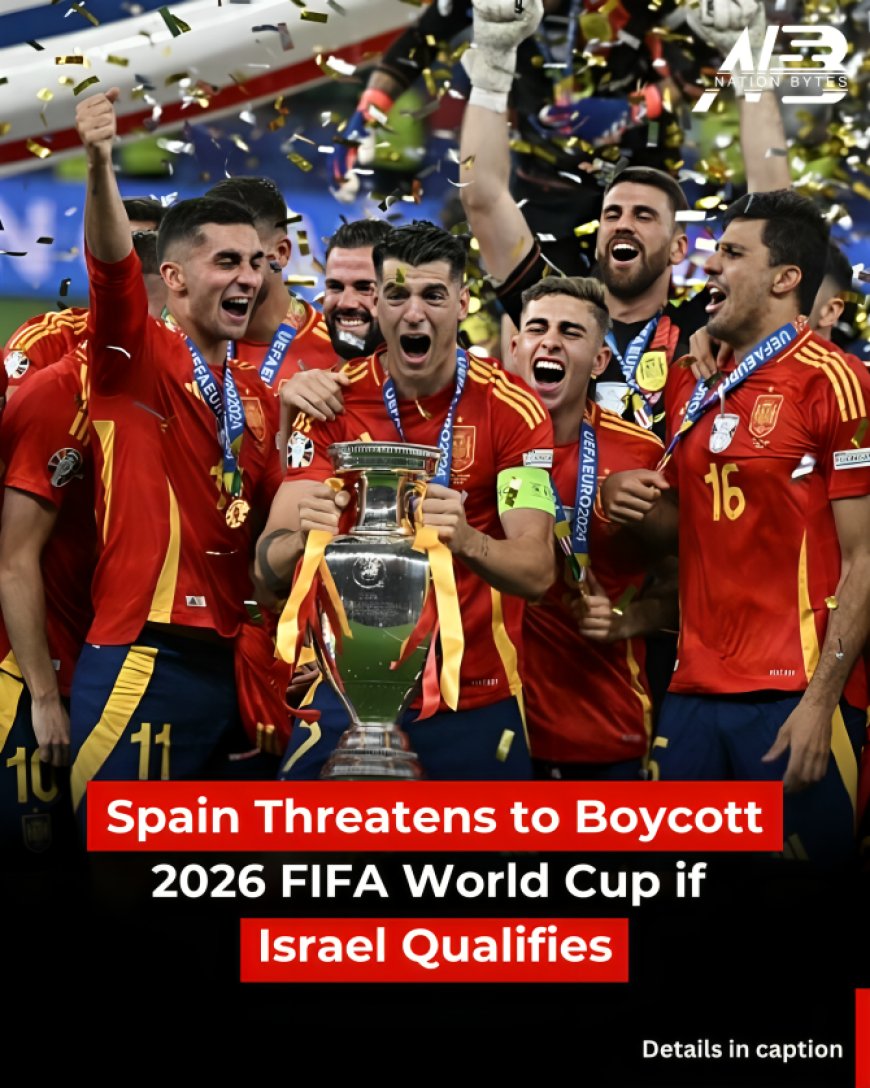Spain Threatens to Boycott 2026 FIFA World Cup if Israel Qualifies
Spain has warned it may boycott the 2026 FIFA World Cup if Israel qualifies. Spanish leaders demand FIFA and UEFA impose sanctions, drawing parallels with Russia’s ban.

Spain has shaken the football world by threatening to boycott the 2026 FIFA World Cup if Israel qualifies for the tournament. Reports from international media suggest that Spain’s participation could be in doubt if no sanctions are imposed on Israel.
The announcement has sparked widespread debate, with many comparing the potential action to the sanctions placed on Russia, which was banned from international football competitions following its invasion of Ukraine.
Spanish Prime Minister Pedro Sanchez has taken a strong position, urging global sporting bodies, including FIFA and UEFA, to act against Israel.
Sanchez’s call was echoed by Patxi Lopez, a senior Socialist leader in Spain’s Congress. He stated that Spain would formally push for a boycott if FIFA does not take action:
“We will consider it later and make a formal request at the right time if no action is taken,” Lopez declared.
Meanwhile, Minister of Sports Pilar Alegria added:
“Sport is not, and cannot be, an island independent of what happens in the real world.”
Spain’s threat carries significant weight because of its standing in world football.
-
Spain is the current European champion.
-
The team is ranked No. 1 in FIFA rankings.
-
They are strong contenders to win the 2026 World Cup, hosted jointly by the United States, Mexico, and Canada.
Given their stature, a Spanish boycott would create a major crisis for FIFA and could set a precedent for other nations to follow.
Israel currently sits third in its qualifying group, behind Norway and Italy, but remains in contention for a World Cup spot.
-
Israel has never qualified for the FIFA World Cup since 1970.
-
The current qualifying campaign is seen as their best chance in years.
However, Spain’s warning has overshadowed Israel’s sporting efforts, adding political tension to the qualification process.
So far, FIFA and UEFA have not responded to Spain’s warning. The situation presents a major dilemma for football’s governing bodies:
-
Taking no action could anger Spain and other nations sympathetic to their stance.
-
Sanctioning Israel could ignite a geopolitical storm and accusations of double standards.
The outcome of this standoff could set the tone for how FIFA handles political disputes in football going forward.
Spain’s statement has already sparked heated debate in sporting and political circles:
-
Some argue that politics should not interfere in sport, warning that FIFA’s credibility could be damaged.
-
Others say Spain is right, pointing out that Russia was banned for its actions, and Israel should face similar consequences if international consensus supports it.
The 2026 FIFA World Cup is expected to be the biggest tournament in football history, with 48 teams competing. Spain’s absence would:
-
Undermine the tournament’s credibility.
-
Lower the level of competition.
-
Potentially lead to other countries joining the protest.
For fans, it would mean missing out on watching one of the world’s strongest teams on football’s biggest stage.
Spain’s threat to boycott the 2026 FIFA World Cup if Israel qualifies has put FIFA under immense pressure. With Spain being a top-ranked team and a tournament favorite, its stance could change the course of the World Cup and force football authorities to take a political position.
For now, the world waits for FIFA and UEFA’s response. Will they sanction Israel, find a compromise, or risk Spain pulling out of football’s greatest event?

 Israr Ahmed
Israr Ahmed